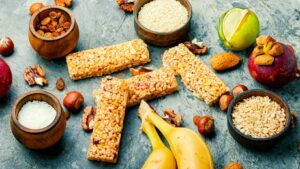Sports Nutrition Bars
- Nutritional Profile: Quality sports nutrition bars typically contain a balanced mix of protein (10-30 grams), carbohydrates (25-50 grams), and healthy fats to support energy and recovery.
- Ingredient Quality: Look for bars made with whole food ingredients such as nuts, seeds, and oats, avoiding those with excessive sugars and artificial additives.
- Variety of Types: Sports nutrition bars can serve specific purposes such as energy bars for quick fuel, protein bars for muscle recovery, and meal replacement bars for convenience.
- Convenience: Easily portable, these bars provide on-the-go nourishment, making them ideal for busy athletes and fitness enthusiasts.
- Benefits of Fiber: Including fiber (2-10 grams) in sports nutrition bars aids digestive health and helps maintain satiety between meals.
- Watch Sugar Intake: Be mindful of sugar content, aiming for bars with 5 grams of sugar or less to avoid energy crashes and maintain a healthy diet.
 In today’s fast-paced world, maintaining a balanced diet can be a challenge, especially for athletes and fitness enthusiasts. Sports nutrition bars have emerged as a convenient solution, offering a quick and tasty way to fuel workouts and recovery. Packed with essential nutrients, these bars cater to a variety of dietary needs and preferences, making them a popular choice for anyone looking to enhance their performance.
In today’s fast-paced world, maintaining a balanced diet can be a challenge, especially for athletes and fitness enthusiasts. Sports nutrition bars have emerged as a convenient solution, offering a quick and tasty way to fuel workouts and recovery. Packed with essential nutrients, these bars cater to a variety of dietary needs and preferences, making them a popular choice for anyone looking to enhance their performance.
With countless options available, it’s crucial to understand what sets a quality sports nutrition bar apart from the rest. From protein content to ingredient sourcing, the right bar can make all the difference in achieving fitness goals. This article dives into the benefits of sports nutrition bars, helping readers make informed choices that align with their lifestyle and athletic aspirations.
Overview of Sports Nutrition Bars
Sports nutrition bars provide a convenient option for athletes and fitness enthusiasts seeking quick energy and nutrients. These bars often contain a balanced blend of macronutrients, like proteins, carbohydrates, and fats, tailored to support various activities and goals.
Key Characteristics
- Protein Content: Quality sports nutrition bars typically feature 10 to 30 grams of protein per serving, depending on the intended purpose, such as muscle recovery or meal replacement.
- Carbohydrate Sources: Many bars include complex carbohydrates from oats, brown rice, or sweet potatoes, helping sustain energy during workouts. Simple sugars may also be present for quick energy replenishment.
- Ingredient Quality: Sourcing high-quality ingredients ensures optimal nutrition. Look for bars containing whole foods, such as nuts, seeds, and dried fruits, rather than artificial additives or excessive sugars.
- Fiber Inclusion: Fiber content can range from 2 to 10 grams. Increased fiber promotes digestive health and helps maintain satiety between meals.
- Caloric Value: Sports nutrition bars typically range from 200 to 400 calories, making them suitable for energy replenishment before or after intensive training sessions.
- Portability: Their compact design makes sports nutrition bars easy to pack for on-the-go snacking, ensuring nourishment pre- or post-workout.
- Meal Replacement: High-calorie and nutrient-dense bars serve as effective meal replacements, especially for time-constrained individuals.
- Variety of Flavors: With flavors ranging from chocolate peanut butter to berry blend, these bars cater to diverse taste preferences.
- Convenient Tracking: Nutritional labels on bars simplify tracking macronutrient intake, aiding athletes in meeting specific dietary requirements.
- Enhanced Performance: Regular consumption of sports nutrition bars promotes sustained energy and supports recovery, contributing to improved performance in physical activities.
Types of Sports Nutrition Bars
Sports nutrition bars come in various types, each designed to cater to specific dietary needs and workout goals. Understanding these types helps athletes and fitness enthusiasts select the right bars for their performance.
Energy Bars
Energy bars primarily provide quick energy sources for athletes. These bars typically contain higher carbohydrate levels, often between 25 and 50 grams per serving. Common ingredients include oats, rice, and sugars, which deliver rapid energy. They’re especially useful before or during workouts and for endurance sports, where maintaining energy levels is crucial.
Protein Bars
Protein bars focus on muscle repair and recovery, containing protein content ranging from 15 to 30 grams. They often include whey, casein, or plant-based proteins. These bars also typically incorporate healthy fats and some carbohydrates, making them suitable for post-workout nourishment. They support muscle recovery and can aid in meeting daily protein requirements for active individuals.
Meal Replacement Bars
Meal replacement bars offer a balanced mixture of macronutrients, serving as convenient alternatives to traditional meals. These bars usually contain 200 to 400 calories and include a blend of proteins, fats, and carbohydrates, ensuring a substantial intake of nutrients. They’re designed for those on-the-go or those needing a quick, complete meal. They often contain added vitamins and minerals to complement the macronutrient profile, addressing overall nutritional needs.
Benefits of Sports Nutrition Bars
Sports nutrition bars offer numerous advantages for individuals seeking to optimize their diet, especially athletes and fitness enthusiasts. They combine convenience, essential nutrients, and performance support.
Convenience and Portability
Convenience and portability define sports nutrition bars. They fit easily into bags, making them a practical choice for on-the-go lifestyles. Quick access to nutrients post-workout helps maintain energy levels and supports recovery. No preparation or refrigeration is necessary, allowing for immediate consumption whenever hunger strikes.
Nutritional Support for Athletes
Nutritional support for athletes is crucial, and sports nutrition bars deliver targeted benefits. These bars typically contain protein levels from 10 to 30 grams, aiding in muscle repair and recovery. Carbohydrate sources range from 25 to 50 grams, providing sustained energy during strenuous activities. Fiber content enhances digestive health while added vitamins and minerals fortify overall nutrition. Tailored formulations address the specific needs of different athletic pursuits, ensuring optimal performance during training and competition.
Ingredients to Look For
When selecting sports nutrition bars, understanding the ingredients can help maximize their benefits for performance and recovery. Focus on the following key components to ensure the bars meet nutritional needs.
Protein Sources
Quality protein sources in sports nutrition bars include whey, casein, pea, and soy proteins. Whey protein provides fast absorption, ideal for post-workout recovery. Casein offers a slower release, suitable for sustained muscle repair. Plant-based options, such as pea and soy proteins, provide essential amino acids while catering to vegetarian and vegan diets. Aim for protein content in the range of 10 to 30 grams per bar to effectively support muscle growth and repair.
Carbohydrate Types
Carbohydrates play a crucial role in replenishing energy stores. Look for complex carbohydrates such as oats, whole grains, and brown rice. These sources provide a steady release of energy, which aids in endurance activities. Simple carbohydrates, like glucose or dextrose, are beneficial for quick energy boosts during intense workouts. Sports nutrition bars typically contain 25 to 50 grams of carbohydrates; ensure they include a balance of both complex and simple types.
Added Nutrients and Supplements
Added nutrients and supplements enhance the nutritional profile of sports nutrition bars. Key vitamins and minerals, such as B vitamins and electrolytes, support energy production and hydration. Omega-3 fatty acids and branched-chain amino acids (BCAAs) may improve recovery and reduce muscle soreness. Look for bars with these added nutrients to provide comprehensive support for training and overall wellness.
Potential Drawbacks of Sports Nutrition Bars
While sports nutrition bars offer convenience and targeted nutritional benefits, they also come with potential drawbacks that consumers should consider.
Sugar Content
High sugar content often appears in sports nutrition bars, which can undermine health goals. Many bars contain added sugars, contributing to elevated caloric intake without significant nutritional benefits. Some products contain 15 to 30 grams of sugar per bar, which may lead to spikes in blood sugar and energy crashes. Checking labels for total sugar content, as well as sugars from natural sources like fruit, remains essential. Choosing bars with 5 grams of sugar or less can help maintain a healthier dietary balance.
Artificial Ingredients
 Artificial ingredients can be prevalent in many sports nutrition bars. These include artificial sweeteners, preservatives, and colorings, which may pose health risks or lead to digestive issues for some individuals. Some bars contain ingredients like maltodextrin or high fructose corn syrup, which lack nutritional value. Selecting bars with minimal and recognizable ingredients lists, focusing on whole food sources, is a way to avoid potential adverse effects and optimize nutrition.
Artificial ingredients can be prevalent in many sports nutrition bars. These include artificial sweeteners, preservatives, and colorings, which may pose health risks or lead to digestive issues for some individuals. Some bars contain ingredients like maltodextrin or high fructose corn syrup, which lack nutritional value. Selecting bars with minimal and recognizable ingredients lists, focusing on whole food sources, is a way to avoid potential adverse effects and optimize nutrition.
A Practical Solution for Athletes and Fitness Enthusiasts Looking to Enhance Performance and Recovery
Sports nutrition bars offer a practical solution for athletes and fitness enthusiasts looking to enhance performance and recovery. With a variety of options available, it’s crucial to choose bars that align with individual dietary needs and fitness goals. By prioritizing quality ingredients and understanding the different types of bars, consumers can make informed decisions that support their active lifestyles.
While convenience is a significant advantage, being mindful of sugar content and artificial ingredients ensures a healthier choice. By incorporating sports nutrition bars into their routines, individuals can enjoy the benefits of sustained energy and essential nutrients, making it easier to stay on track with their nutrition and performance objectives.

